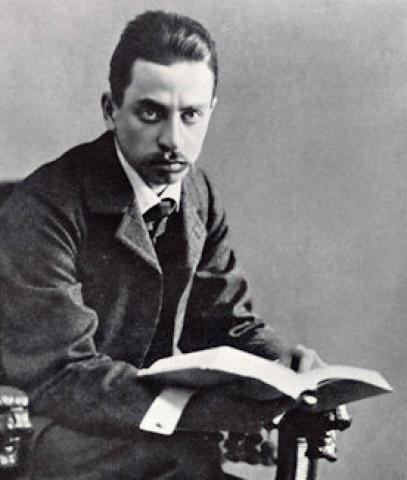
When you read the exquisite poetry of Rainer Maria Rilke, you imagine that the poet knew numerous elusive, intuitive truths. Well, guess what? He did! And he poured them out to a virtual nonentity, a guy named Franz Kappus, who was really not so much a "young poet" as a new military officer. Kappus wrote downcast letters to Rainer, and received, initially, literary advice:
Do not write love poems, at least at first; they present the greatest challenge. It requires great, fully ripened power to produce something personal, something unique, when there are so many good and sometimes even brilliant renditions in great numbers.
(I suspect that this translation, by Joan M. Burnham, is not the most preeminent.) Gradually, Rilke realizes that Franz will not really be a writer, so he moves on to other topics of massive importance — and his advice is even better! For example, sex (the subject of letter number 7):
Young people often err, and that intensely so, in this way, since it is their nature to be impatient: They throw themselves at each other when love comes upon them. They fragment themselves, just as they are, in all of their disarray and confusion. But what is to follow? What should they do if this takes root, this heap of half-broken things that they call togetherness and that they would like to call their happiness?
If only I’d read this when I was 23! No doubt it would have had no effect on me whatsoever. (The problem with all literature is that it doesn’t make sense before you’re 47.) (And by then, you don’t really need it, because you’ve learned all that bitter knowledge yourself.)
The picture of Rilke that emerges from Letters to a Young Poet, which is written over the course of five years, is of a deeply solitary, transient guy in poor health. He writes from Paris; Viareggio, Italy; Worpswede, Germany; Rome; Flädie, Sweden; Jonsered, Sweden and Paris again. At one point he apologizes that he can’t send Franz his books — he doesn’t have enough money. Some of his opinions are completely weird:
Of all my books there are only a few that are indispensable to me. Two of them are constantly at my fingertips wherever I may be. They are here with me now: the Bible and the books of the great Danish writer, Jens Peter Jacobsen.
Why does Rilke take such a close interest in Kappus? Was he gay? Or pseudo-gay? Was he attempting to formulate his theories on everything, with one eye to writing a book? Did he know that Franz would collect his letters? That’s doubtful. Would he just help anyone he encountered? (Rilke apparently wasn’t a professor. He had time, which few people do today, to be wise.) Also he could tenderly stitch together God and a searching young man. One wishes Rilke had invented a counter-psychoanalysis, to untangle the kooky complexities of Freudianism. In fact, he does anticipate elements of Jung. Some of his prophecies are just now coming true:
Within the man, motherhood exists also, it seems to me, both physical and spiritual. His part in procreation is also a type of giving birth, and giving birth it is when he draws strength from his innermost abundance.
Perhaps the sexes are more closely related than one would think. Perhaps the great renewal of the world will consist of this, that man and woman, freed of all confused feelings and desires, shall no longer seek each other as opposites, but simply as members of a family and neighbors, and will unite as human beings, in order to simply, earnestly, patiently and jointly bear the heavy responsibility of sexuality that has been entrusted to them.
I wish the brilliant poet had discussed more topics, every topic: whether one should drink milk, life on other planets, the meaning of lint. This book is not an elaboration of a life-system. It’s a series of letters. Did Rilke invent the genre of epistolary philosophy?

Leave Your Comments